Strategies for Teaching Early Reading and Assessments
VerifiedAdded on 2023/06/08
|10
|3054
|369
Report
AI Summary
This report analyzes the key practices and components of teaching early reading to promote effective child development. It discusses the importance of oral language, concepts of print, phonological awareness, phonemic awareness, phonics, vocabulary, fluency, and comprehension in children's early reading development. The report critically evaluates effective teaching strategies, such as the pedagogy approach, active learning, and group discussions, emphasizing the teacher's role in fostering an engaging and attractive learning environment. It also examines the role of assessments in early reading, including both summative and formative methods, to identify children's strengths and weaknesses. The report recommends focusing on student reading, identifying mistakes, and utilizing strength-based approaches to enhance vocabulary and language skills. It highlights the significance of providing assessments and projects to reinforce vocabulary-related concepts and writing sentences through picture identification. The overall aim is to provide insights into how to create a beneficial environment for child development in early reading stages.
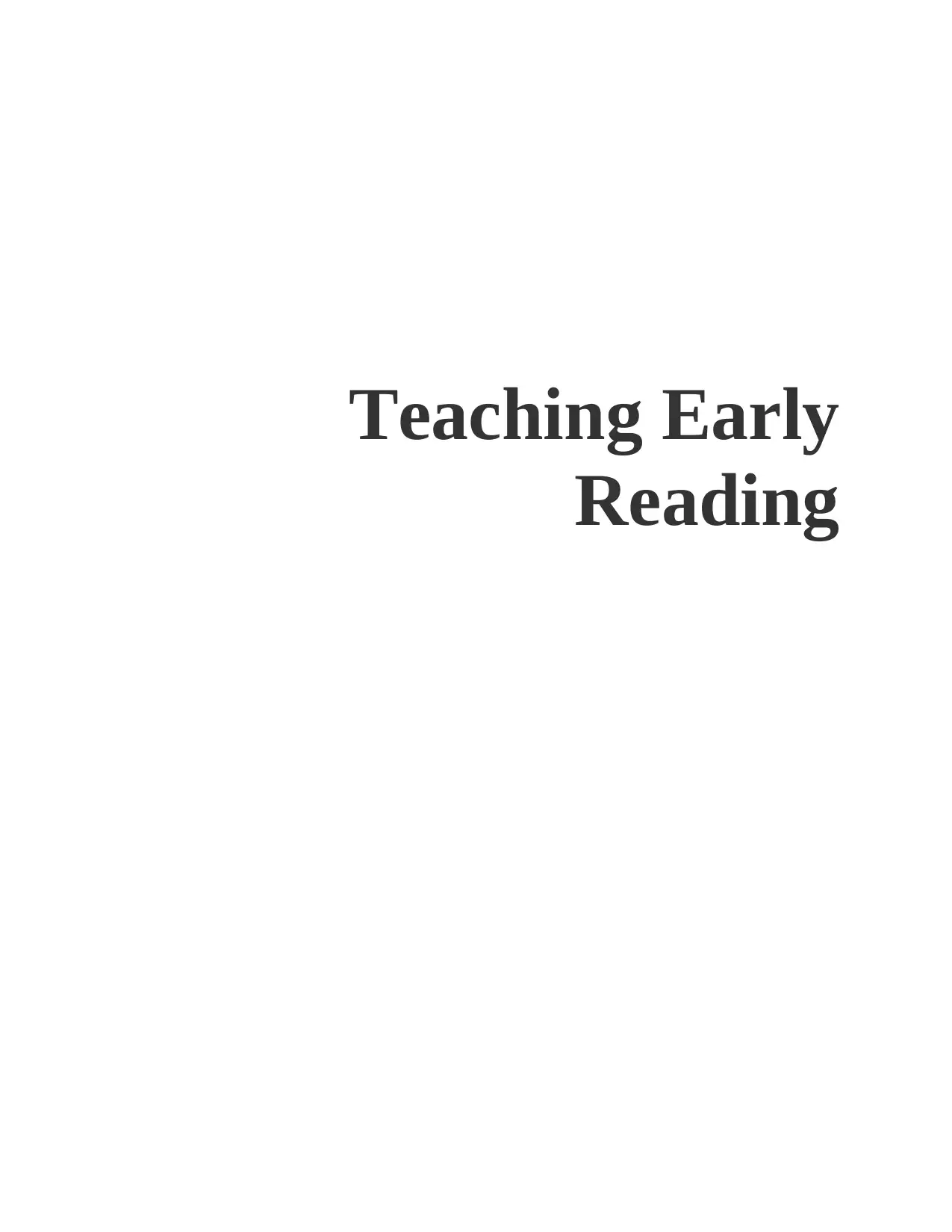
Teaching Early
Reading
Reading
Paraphrase This Document
Need a fresh take? Get an instant paraphrase of this document with our AI Paraphraser
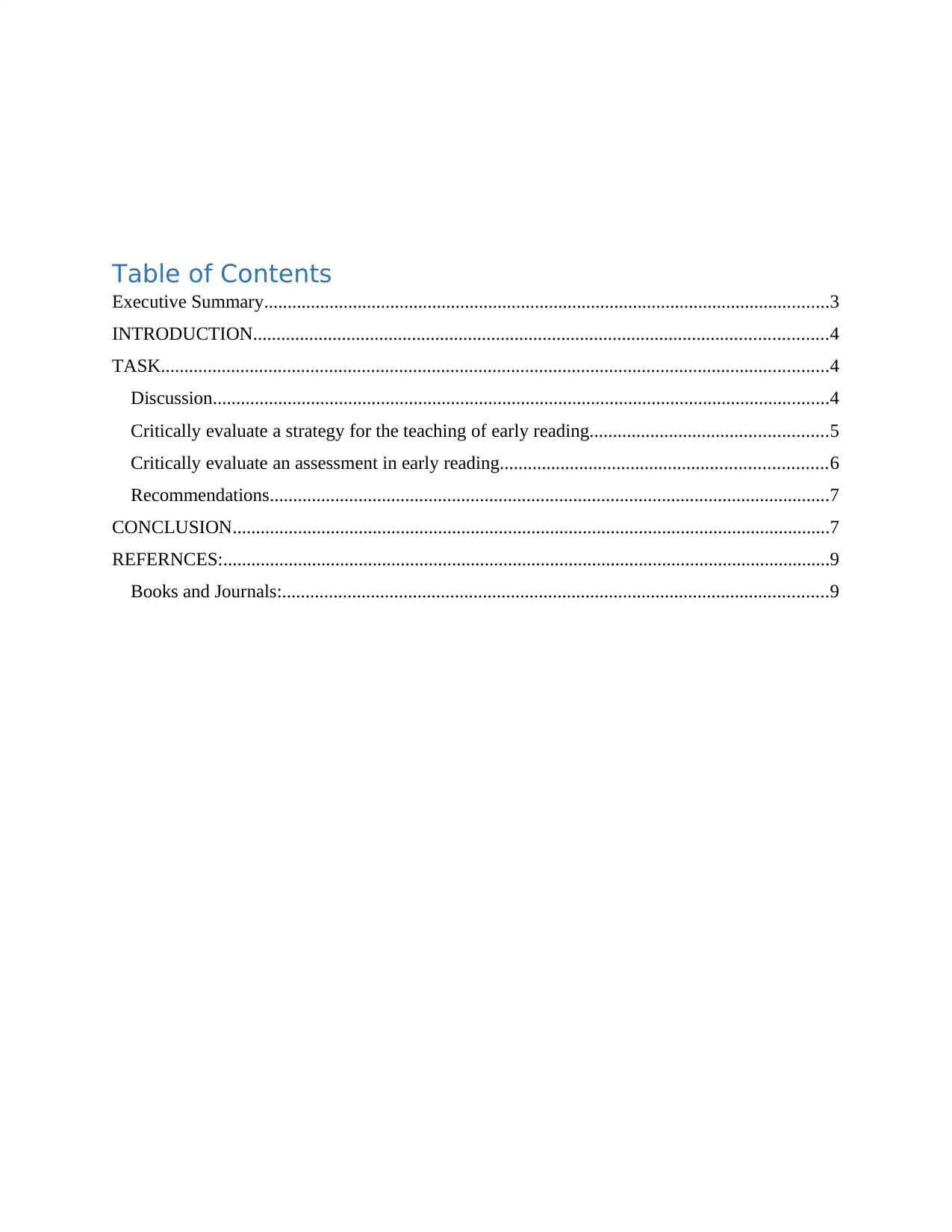
Table of Contents
Executive Summary.........................................................................................................................3
INTRODUCTION...........................................................................................................................4
TASK...............................................................................................................................................4
Discussion....................................................................................................................................4
Critically evaluate a strategy for the teaching of early reading...................................................5
Critically evaluate an assessment in early reading......................................................................6
Recommendations........................................................................................................................7
CONCLUSION................................................................................................................................7
REFERNCES:..................................................................................................................................9
Books and Journals:.....................................................................................................................9
Executive Summary.........................................................................................................................3
INTRODUCTION...........................................................................................................................4
TASK...............................................................................................................................................4
Discussion....................................................................................................................................4
Critically evaluate a strategy for the teaching of early reading...................................................5
Critically evaluate an assessment in early reading......................................................................6
Recommendations........................................................................................................................7
CONCLUSION................................................................................................................................7
REFERNCES:..................................................................................................................................9
Books and Journals:.....................................................................................................................9
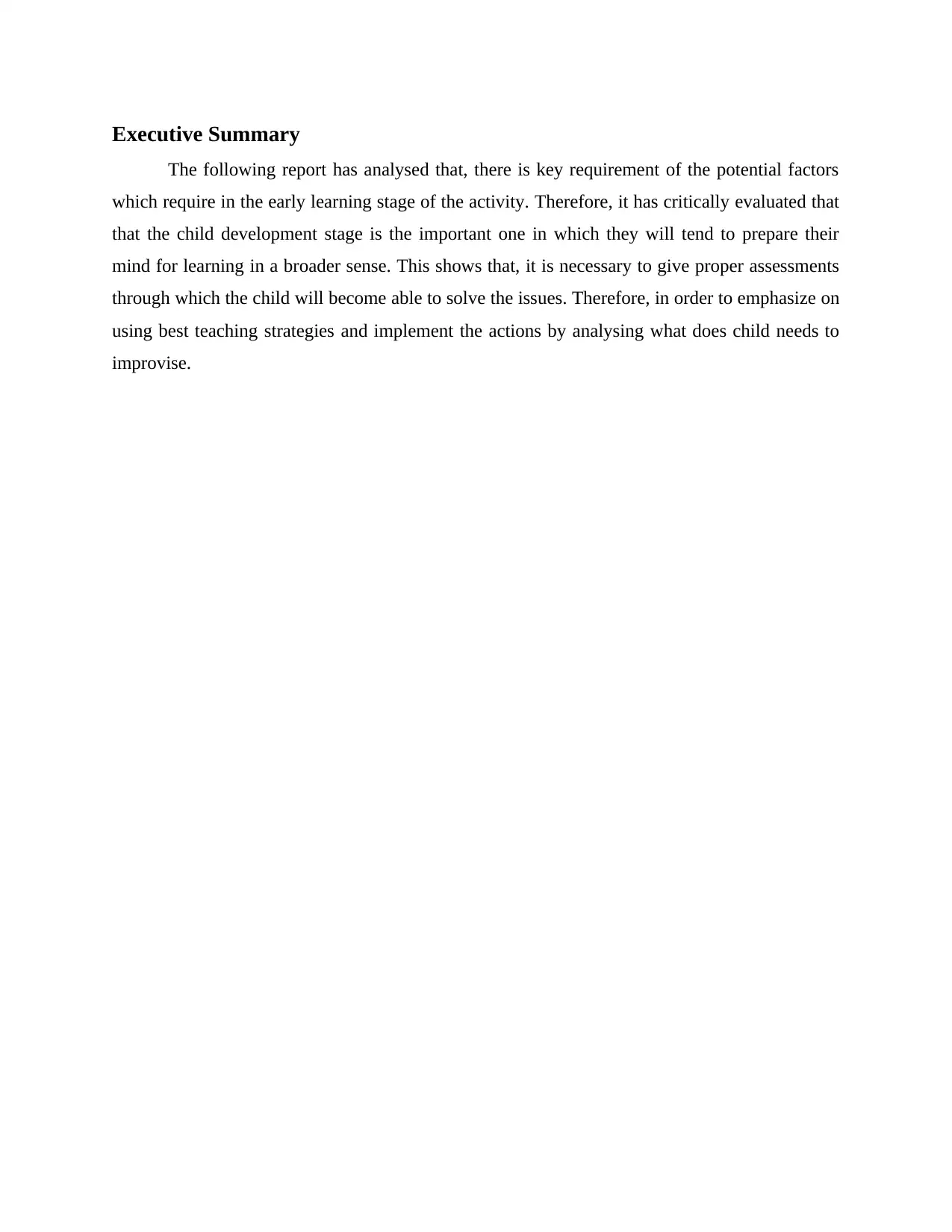
Executive Summary
The following report has analysed that, there is key requirement of the potential factors
which require in the early learning stage of the activity. Therefore, it has critically evaluated that
that the child development stage is the important one in which they will tend to prepare their
mind for learning in a broader sense. This shows that, it is necessary to give proper assessments
through which the child will become able to solve the issues. Therefore, in order to emphasize on
using best teaching strategies and implement the actions by analysing what does child needs to
improvise.
The following report has analysed that, there is key requirement of the potential factors
which require in the early learning stage of the activity. Therefore, it has critically evaluated that
that the child development stage is the important one in which they will tend to prepare their
mind for learning in a broader sense. This shows that, it is necessary to give proper assessments
through which the child will become able to solve the issues. Therefore, in order to emphasize on
using best teaching strategies and implement the actions by analysing what does child needs to
improvise.
⊘ This is a preview!⊘
Do you want full access?
Subscribe today to unlock all pages.

Trusted by 1+ million students worldwide
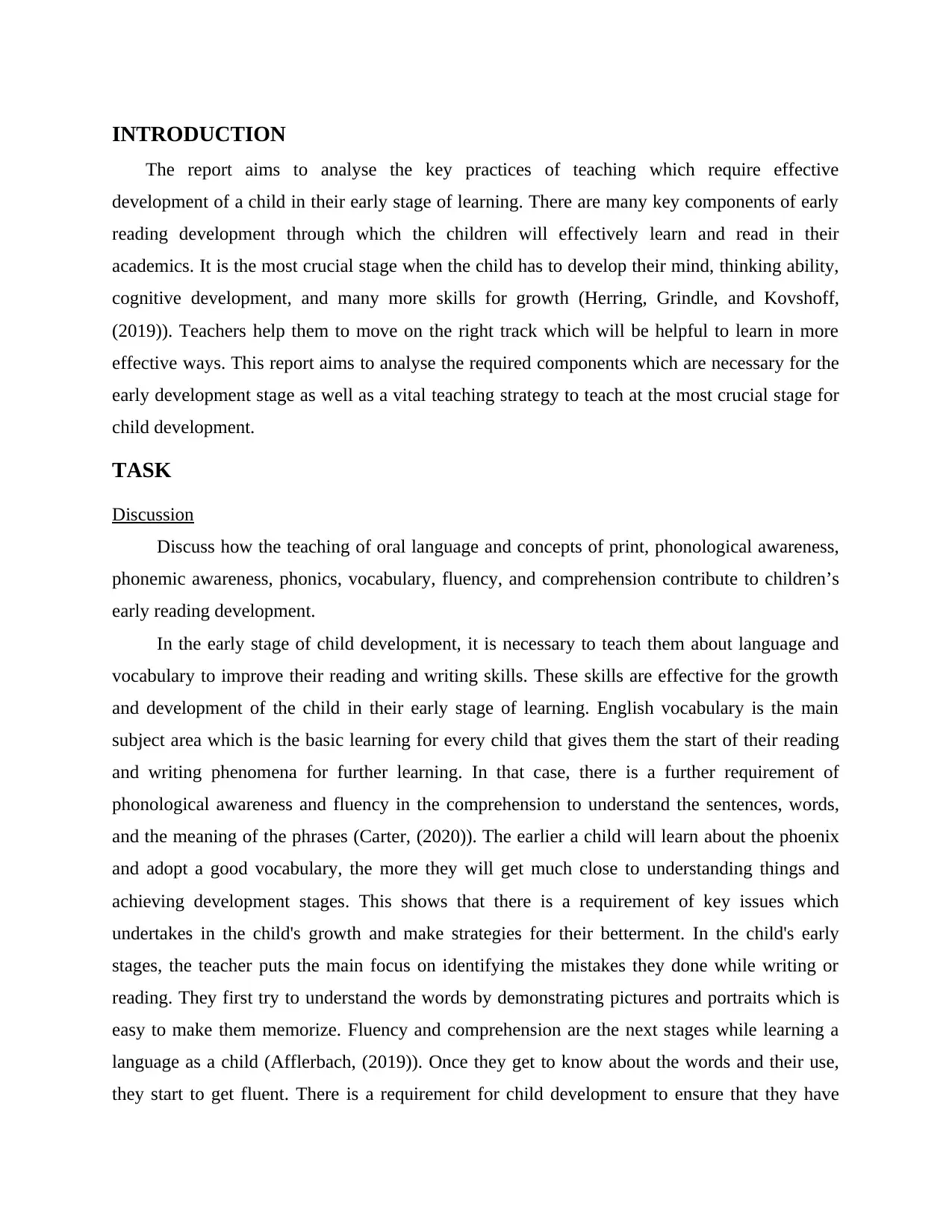
INTRODUCTION
The report aims to analyse the key practices of teaching which require effective
development of a child in their early stage of learning. There are many key components of early
reading development through which the children will effectively learn and read in their
academics. It is the most crucial stage when the child has to develop their mind, thinking ability,
cognitive development, and many more skills for growth (Herring, Grindle, and Kovshoff,
(2019)). Teachers help them to move on the right track which will be helpful to learn in more
effective ways. This report aims to analyse the required components which are necessary for the
early development stage as well as a vital teaching strategy to teach at the most crucial stage for
child development.
TASK
Discussion
Discuss how the teaching of oral language and concepts of print, phonological awareness,
phonemic awareness, phonics, vocabulary, fluency, and comprehension contribute to children’s
early reading development.
In the early stage of child development, it is necessary to teach them about language and
vocabulary to improve their reading and writing skills. These skills are effective for the growth
and development of the child in their early stage of learning. English vocabulary is the main
subject area which is the basic learning for every child that gives them the start of their reading
and writing phenomena for further learning. In that case, there is a further requirement of
phonological awareness and fluency in the comprehension to understand the sentences, words,
and the meaning of the phrases (Carter, (2020)). The earlier a child will learn about the phoenix
and adopt a good vocabulary, the more they will get much close to understanding things and
achieving development stages. This shows that there is a requirement of key issues which
undertakes in the child's growth and make strategies for their betterment. In the child's early
stages, the teacher puts the main focus on identifying the mistakes they done while writing or
reading. They first try to understand the words by demonstrating pictures and portraits which is
easy to make them memorize. Fluency and comprehension are the next stages while learning a
language as a child (Afflerbach, (2019)). Once they get to know about the words and their use,
they start to get fluent. There is a requirement for child development to ensure that they have
The report aims to analyse the key practices of teaching which require effective
development of a child in their early stage of learning. There are many key components of early
reading development through which the children will effectively learn and read in their
academics. It is the most crucial stage when the child has to develop their mind, thinking ability,
cognitive development, and many more skills for growth (Herring, Grindle, and Kovshoff,
(2019)). Teachers help them to move on the right track which will be helpful to learn in more
effective ways. This report aims to analyse the required components which are necessary for the
early development stage as well as a vital teaching strategy to teach at the most crucial stage for
child development.
TASK
Discussion
Discuss how the teaching of oral language and concepts of print, phonological awareness,
phonemic awareness, phonics, vocabulary, fluency, and comprehension contribute to children’s
early reading development.
In the early stage of child development, it is necessary to teach them about language and
vocabulary to improve their reading and writing skills. These skills are effective for the growth
and development of the child in their early stage of learning. English vocabulary is the main
subject area which is the basic learning for every child that gives them the start of their reading
and writing phenomena for further learning. In that case, there is a further requirement of
phonological awareness and fluency in the comprehension to understand the sentences, words,
and the meaning of the phrases (Carter, (2020)). The earlier a child will learn about the phoenix
and adopt a good vocabulary, the more they will get much close to understanding things and
achieving development stages. This shows that there is a requirement of key issues which
undertakes in the child's growth and make strategies for their betterment. In the child's early
stages, the teacher puts the main focus on identifying the mistakes they done while writing or
reading. They first try to understand the words by demonstrating pictures and portraits which is
easy to make them memorize. Fluency and comprehension are the next stages while learning a
language as a child (Afflerbach, (2019)). Once they get to know about the words and their use,
they start to get fluent. There is a requirement for child development to ensure that they have
Paraphrase This Document
Need a fresh take? Get an instant paraphrase of this document with our AI Paraphraser
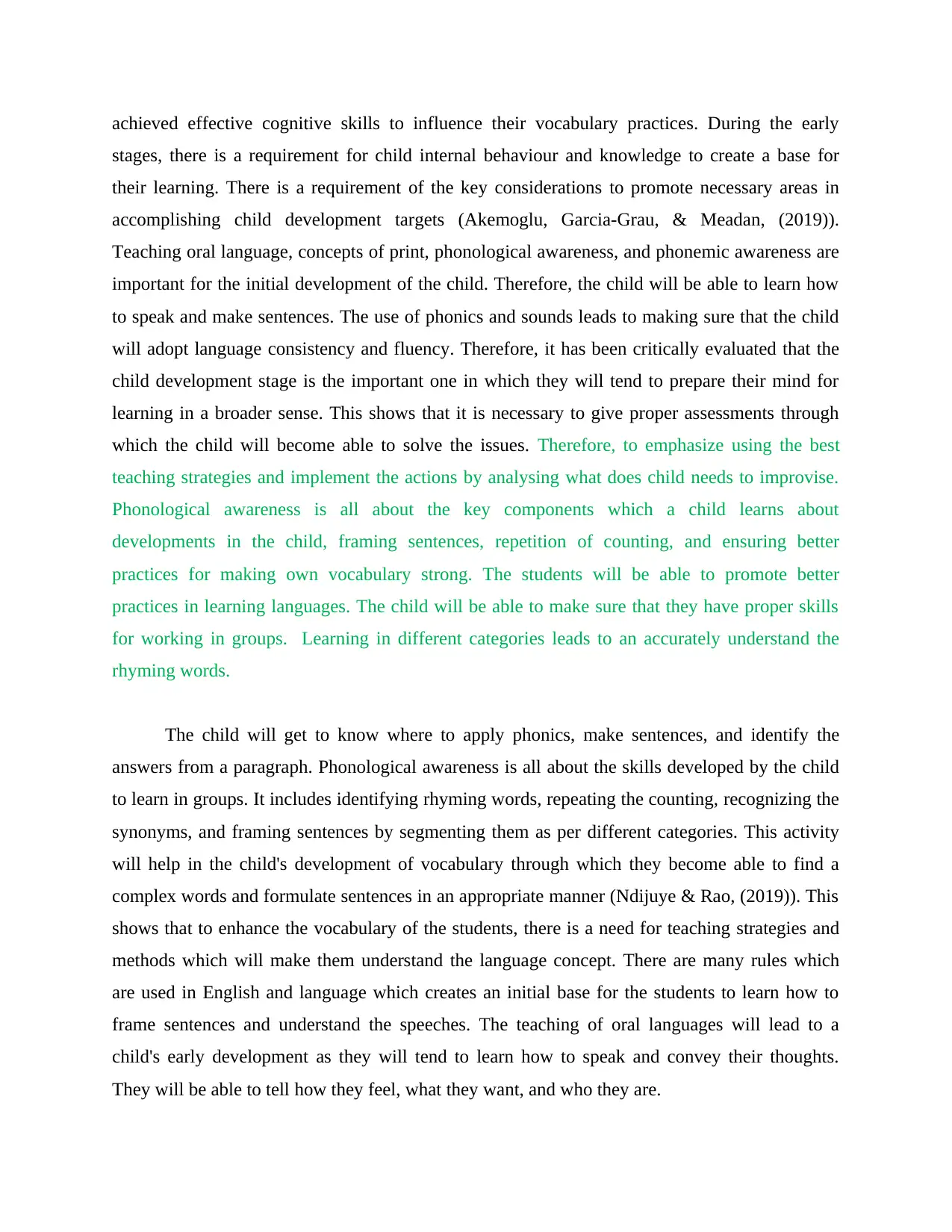
achieved effective cognitive skills to influence their vocabulary practices. During the early
stages, there is a requirement for child internal behaviour and knowledge to create a base for
their learning. There is a requirement of the key considerations to promote necessary areas in
accomplishing child development targets (Akemoglu, Garcia-Grau, & Meadan, (2019)).
Teaching oral language, concepts of print, phonological awareness, and phonemic awareness are
important for the initial development of the child. Therefore, the child will be able to learn how
to speak and make sentences. The use of phonics and sounds leads to making sure that the child
will adopt language consistency and fluency. Therefore, it has been critically evaluated that the
child development stage is the important one in which they will tend to prepare their mind for
learning in a broader sense. This shows that it is necessary to give proper assessments through
which the child will become able to solve the issues. Therefore, to emphasize using the best
teaching strategies and implement the actions by analysing what does child needs to improvise.
Phonological awareness is all about the key components which a child learns about
developments in the child, framing sentences, repetition of counting, and ensuring better
practices for making own vocabulary strong. The students will be able to promote better
practices in learning languages. The child will be able to make sure that they have proper skills
for working in groups. Learning in different categories leads to an accurately understand the
rhyming words.
The child will get to know where to apply phonics, make sentences, and identify the
answers from a paragraph. Phonological awareness is all about the skills developed by the child
to learn in groups. It includes identifying rhyming words, repeating the counting, recognizing the
synonyms, and framing sentences by segmenting them as per different categories. This activity
will help in the child's development of vocabulary through which they become able to find a
complex words and formulate sentences in an appropriate manner (Ndijuye & Rao, (2019)). This
shows that to enhance the vocabulary of the students, there is a need for teaching strategies and
methods which will make them understand the language concept. There are many rules which
are used in English and language which creates an initial base for the students to learn how to
frame sentences and understand the speeches. The teaching of oral languages will lead to a
child's early development as they will tend to learn how to speak and convey their thoughts.
They will be able to tell how they feel, what they want, and who they are.
stages, there is a requirement for child internal behaviour and knowledge to create a base for
their learning. There is a requirement of the key considerations to promote necessary areas in
accomplishing child development targets (Akemoglu, Garcia-Grau, & Meadan, (2019)).
Teaching oral language, concepts of print, phonological awareness, and phonemic awareness are
important for the initial development of the child. Therefore, the child will be able to learn how
to speak and make sentences. The use of phonics and sounds leads to making sure that the child
will adopt language consistency and fluency. Therefore, it has been critically evaluated that the
child development stage is the important one in which they will tend to prepare their mind for
learning in a broader sense. This shows that it is necessary to give proper assessments through
which the child will become able to solve the issues. Therefore, to emphasize using the best
teaching strategies and implement the actions by analysing what does child needs to improvise.
Phonological awareness is all about the key components which a child learns about
developments in the child, framing sentences, repetition of counting, and ensuring better
practices for making own vocabulary strong. The students will be able to promote better
practices in learning languages. The child will be able to make sure that they have proper skills
for working in groups. Learning in different categories leads to an accurately understand the
rhyming words.
The child will get to know where to apply phonics, make sentences, and identify the
answers from a paragraph. Phonological awareness is all about the skills developed by the child
to learn in groups. It includes identifying rhyming words, repeating the counting, recognizing the
synonyms, and framing sentences by segmenting them as per different categories. This activity
will help in the child's development of vocabulary through which they become able to find a
complex words and formulate sentences in an appropriate manner (Ndijuye & Rao, (2019)). This
shows that to enhance the vocabulary of the students, there is a need for teaching strategies and
methods which will make them understand the language concept. There are many rules which
are used in English and language which creates an initial base for the students to learn how to
frame sentences and understand the speeches. The teaching of oral languages will lead to a
child's early development as they will tend to learn how to speak and convey their thoughts.
They will be able to tell how they feel, what they want, and who they are.
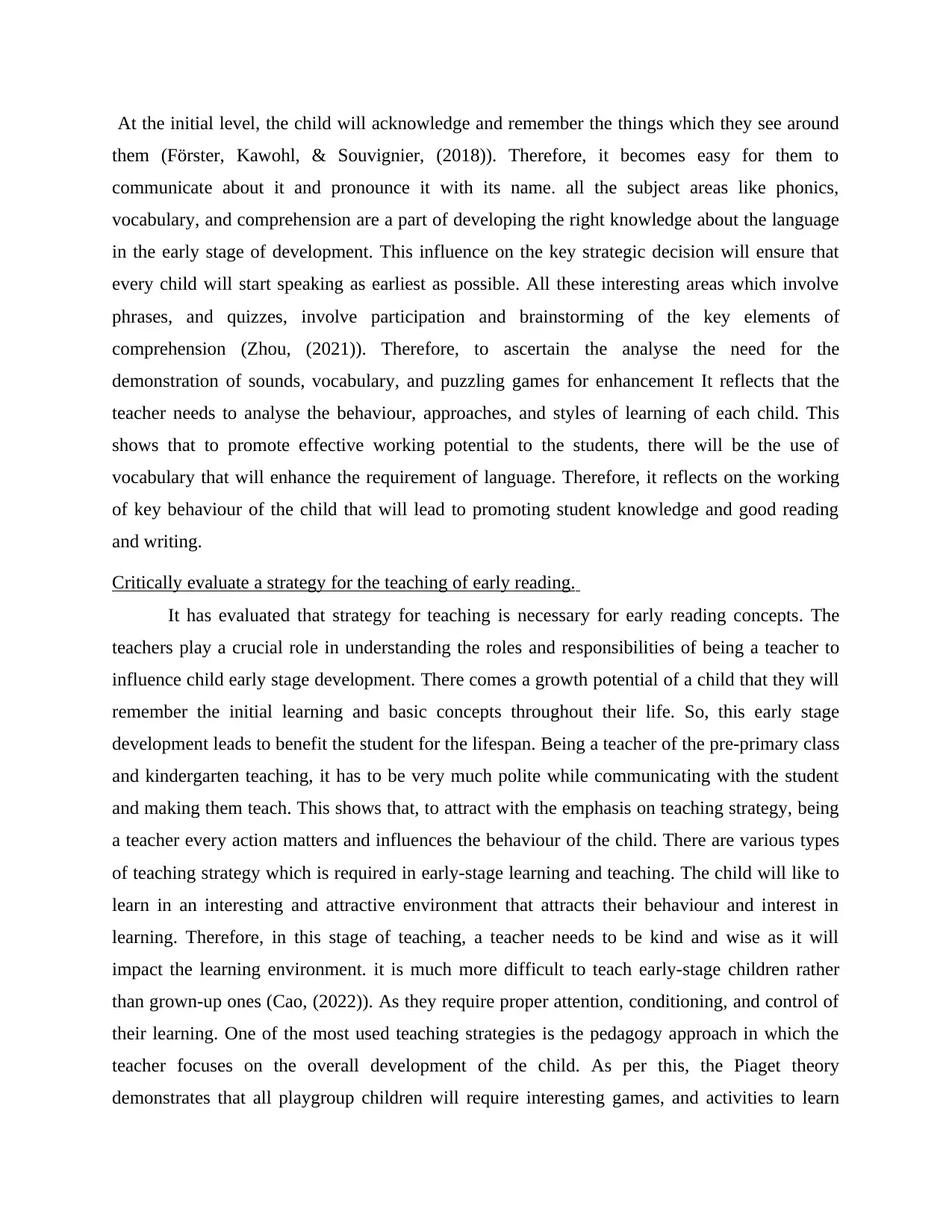
At the initial level, the child will acknowledge and remember the things which they see around
them (Förster, Kawohl, & Souvignier, (2018)). Therefore, it becomes easy for them to
communicate about it and pronounce it with its name. all the subject areas like phonics,
vocabulary, and comprehension are a part of developing the right knowledge about the language
in the early stage of development. This influence on the key strategic decision will ensure that
every child will start speaking as earliest as possible. All these interesting areas which involve
phrases, and quizzes, involve participation and brainstorming of the key elements of
comprehension (Zhou, (2021)). Therefore, to ascertain the analyse the need for the
demonstration of sounds, vocabulary, and puzzling games for enhancement It reflects that the
teacher needs to analyse the behaviour, approaches, and styles of learning of each child. This
shows that to promote effective working potential to the students, there will be the use of
vocabulary that will enhance the requirement of language. Therefore, it reflects on the working
of key behaviour of the child that will lead to promoting student knowledge and good reading
and writing.
Critically evaluate a strategy for the teaching of early reading.
It has evaluated that strategy for teaching is necessary for early reading concepts. The
teachers play a crucial role in understanding the roles and responsibilities of being a teacher to
influence child early stage development. There comes a growth potential of a child that they will
remember the initial learning and basic concepts throughout their life. So, this early stage
development leads to benefit the student for the lifespan. Being a teacher of the pre-primary class
and kindergarten teaching, it has to be very much polite while communicating with the student
and making them teach. This shows that, to attract with the emphasis on teaching strategy, being
a teacher every action matters and influences the behaviour of the child. There are various types
of teaching strategy which is required in early-stage learning and teaching. The child will like to
learn in an interesting and attractive environment that attracts their behaviour and interest in
learning. Therefore, in this stage of teaching, a teacher needs to be kind and wise as it will
impact the learning environment. it is much more difficult to teach early-stage children rather
than grown-up ones (Cao, (2022)). As they require proper attention, conditioning, and control of
their learning. One of the most used teaching strategies is the pedagogy approach in which the
teacher focuses on the overall development of the child. As per this, the Piaget theory
demonstrates that all playgroup children will require interesting games, and activities to learn
them (Förster, Kawohl, & Souvignier, (2018)). Therefore, it becomes easy for them to
communicate about it and pronounce it with its name. all the subject areas like phonics,
vocabulary, and comprehension are a part of developing the right knowledge about the language
in the early stage of development. This influence on the key strategic decision will ensure that
every child will start speaking as earliest as possible. All these interesting areas which involve
phrases, and quizzes, involve participation and brainstorming of the key elements of
comprehension (Zhou, (2021)). Therefore, to ascertain the analyse the need for the
demonstration of sounds, vocabulary, and puzzling games for enhancement It reflects that the
teacher needs to analyse the behaviour, approaches, and styles of learning of each child. This
shows that to promote effective working potential to the students, there will be the use of
vocabulary that will enhance the requirement of language. Therefore, it reflects on the working
of key behaviour of the child that will lead to promoting student knowledge and good reading
and writing.
Critically evaluate a strategy for the teaching of early reading.
It has evaluated that strategy for teaching is necessary for early reading concepts. The
teachers play a crucial role in understanding the roles and responsibilities of being a teacher to
influence child early stage development. There comes a growth potential of a child that they will
remember the initial learning and basic concepts throughout their life. So, this early stage
development leads to benefit the student for the lifespan. Being a teacher of the pre-primary class
and kindergarten teaching, it has to be very much polite while communicating with the student
and making them teach. This shows that, to attract with the emphasis on teaching strategy, being
a teacher every action matters and influences the behaviour of the child. There are various types
of teaching strategy which is required in early-stage learning and teaching. The child will like to
learn in an interesting and attractive environment that attracts their behaviour and interest in
learning. Therefore, in this stage of teaching, a teacher needs to be kind and wise as it will
impact the learning environment. it is much more difficult to teach early-stage children rather
than grown-up ones (Cao, (2022)). As they require proper attention, conditioning, and control of
their learning. One of the most used teaching strategies is the pedagogy approach in which the
teacher focuses on the overall development of the child. As per this, the Piaget theory
demonstrates that all playgroup children will require interesting games, and activities to learn
⊘ This is a preview!⊘
Do you want full access?
Subscribe today to unlock all pages.

Trusted by 1+ million students worldwide
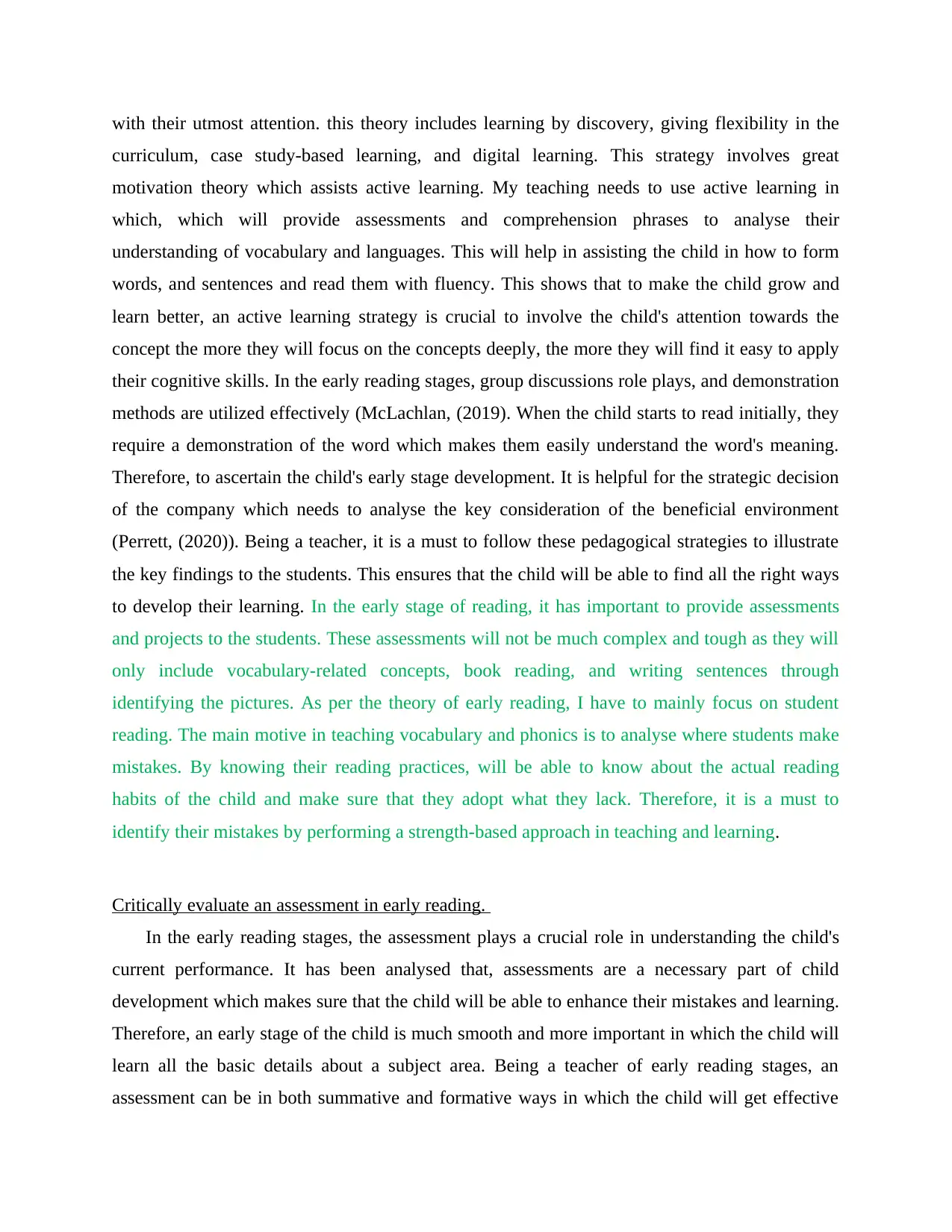
with their utmost attention. this theory includes learning by discovery, giving flexibility in the
curriculum, case study-based learning, and digital learning. This strategy involves great
motivation theory which assists active learning. My teaching needs to use active learning in
which, which will provide assessments and comprehension phrases to analyse their
understanding of vocabulary and languages. This will help in assisting the child in how to form
words, and sentences and read them with fluency. This shows that to make the child grow and
learn better, an active learning strategy is crucial to involve the child's attention towards the
concept the more they will focus on the concepts deeply, the more they will find it easy to apply
their cognitive skills. In the early reading stages, group discussions role plays, and demonstration
methods are utilized effectively (McLachlan, (2019). When the child starts to read initially, they
require a demonstration of the word which makes them easily understand the word's meaning.
Therefore, to ascertain the child's early stage development. It is helpful for the strategic decision
of the company which needs to analyse the key consideration of the beneficial environment
(Perrett, (2020)). Being a teacher, it is a must to follow these pedagogical strategies to illustrate
the key findings to the students. This ensures that the child will be able to find all the right ways
to develop their learning. In the early stage of reading, it has important to provide assessments
and projects to the students. These assessments will not be much complex and tough as they will
only include vocabulary-related concepts, book reading, and writing sentences through
identifying the pictures. As per the theory of early reading, I have to mainly focus on student
reading. The main motive in teaching vocabulary and phonics is to analyse where students make
mistakes. By knowing their reading practices, will be able to know about the actual reading
habits of the child and make sure that they adopt what they lack. Therefore, it is a must to
identify their mistakes by performing a strength-based approach in teaching and learning.
Critically evaluate an assessment in early reading.
In the early reading stages, the assessment plays a crucial role in understanding the child's
current performance. It has been analysed that, assessments are a necessary part of child
development which makes sure that the child will be able to enhance their mistakes and learning.
Therefore, an early stage of the child is much smooth and more important in which the child will
learn all the basic details about a subject area. Being a teacher of early reading stages, an
assessment can be in both summative and formative ways in which the child will get effective
curriculum, case study-based learning, and digital learning. This strategy involves great
motivation theory which assists active learning. My teaching needs to use active learning in
which, which will provide assessments and comprehension phrases to analyse their
understanding of vocabulary and languages. This will help in assisting the child in how to form
words, and sentences and read them with fluency. This shows that to make the child grow and
learn better, an active learning strategy is crucial to involve the child's attention towards the
concept the more they will focus on the concepts deeply, the more they will find it easy to apply
their cognitive skills. In the early reading stages, group discussions role plays, and demonstration
methods are utilized effectively (McLachlan, (2019). When the child starts to read initially, they
require a demonstration of the word which makes them easily understand the word's meaning.
Therefore, to ascertain the child's early stage development. It is helpful for the strategic decision
of the company which needs to analyse the key consideration of the beneficial environment
(Perrett, (2020)). Being a teacher, it is a must to follow these pedagogical strategies to illustrate
the key findings to the students. This ensures that the child will be able to find all the right ways
to develop their learning. In the early stage of reading, it has important to provide assessments
and projects to the students. These assessments will not be much complex and tough as they will
only include vocabulary-related concepts, book reading, and writing sentences through
identifying the pictures. As per the theory of early reading, I have to mainly focus on student
reading. The main motive in teaching vocabulary and phonics is to analyse where students make
mistakes. By knowing their reading practices, will be able to know about the actual reading
habits of the child and make sure that they adopt what they lack. Therefore, it is a must to
identify their mistakes by performing a strength-based approach in teaching and learning.
Critically evaluate an assessment in early reading.
In the early reading stages, the assessment plays a crucial role in understanding the child's
current performance. It has been analysed that, assessments are a necessary part of child
development which makes sure that the child will be able to enhance their mistakes and learning.
Therefore, an early stage of the child is much smooth and more important in which the child will
learn all the basic details about a subject area. Being a teacher of early reading stages, an
assessment can be in both summative and formative ways in which the child will get effective
Paraphrase This Document
Need a fresh take? Get an instant paraphrase of this document with our AI Paraphraser
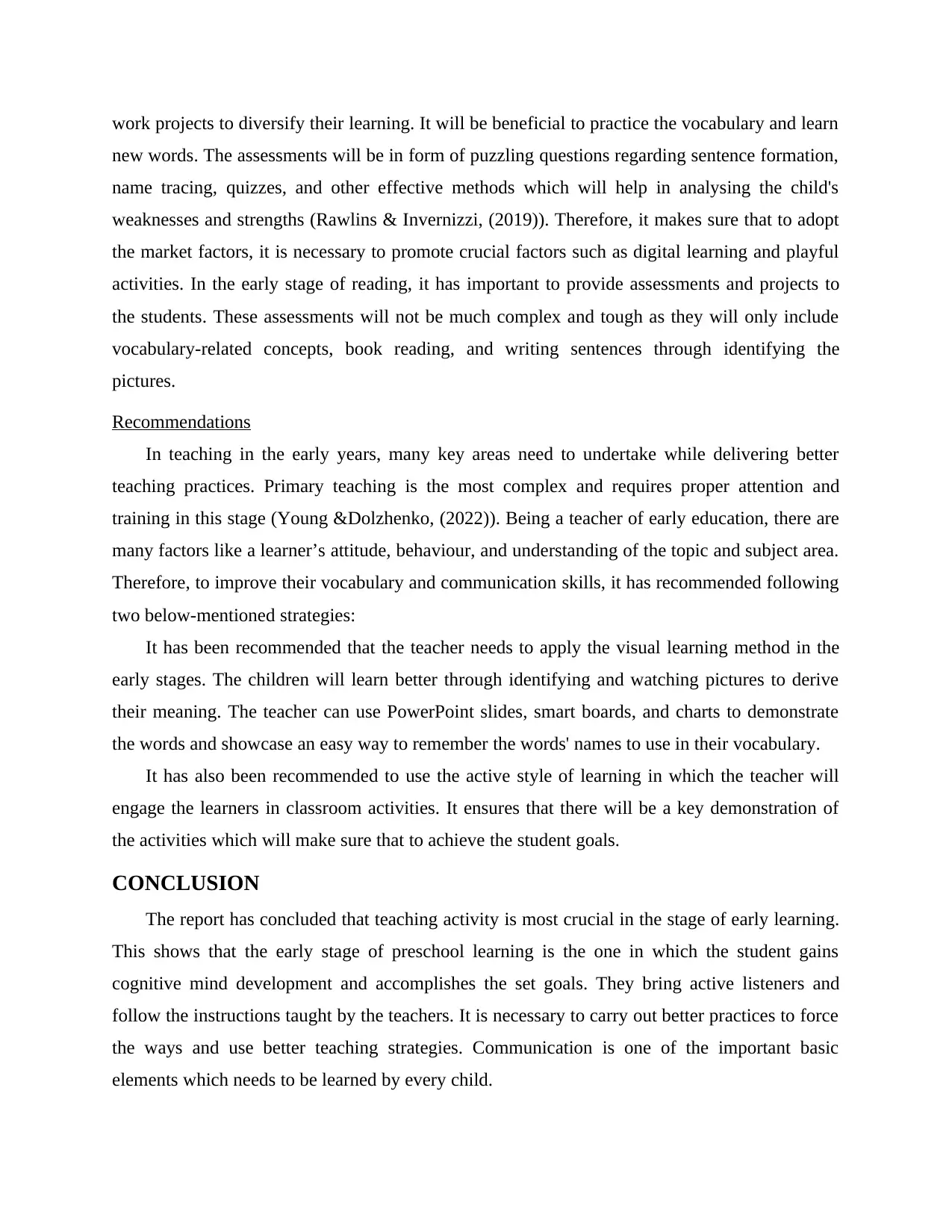
work projects to diversify their learning. It will be beneficial to practice the vocabulary and learn
new words. The assessments will be in form of puzzling questions regarding sentence formation,
name tracing, quizzes, and other effective methods which will help in analysing the child's
weaknesses and strengths (Rawlins & Invernizzi, (2019)). Therefore, it makes sure that to adopt
the market factors, it is necessary to promote crucial factors such as digital learning and playful
activities. In the early stage of reading, it has important to provide assessments and projects to
the students. These assessments will not be much complex and tough as they will only include
vocabulary-related concepts, book reading, and writing sentences through identifying the
pictures.
Recommendations
In teaching in the early years, many key areas need to undertake while delivering better
teaching practices. Primary teaching is the most complex and requires proper attention and
training in this stage (Young &Dolzhenko, (2022)). Being a teacher of early education, there are
many factors like a learner’s attitude, behaviour, and understanding of the topic and subject area.
Therefore, to improve their vocabulary and communication skills, it has recommended following
two below-mentioned strategies:
It has been recommended that the teacher needs to apply the visual learning method in the
early stages. The children will learn better through identifying and watching pictures to derive
their meaning. The teacher can use PowerPoint slides, smart boards, and charts to demonstrate
the words and showcase an easy way to remember the words' names to use in their vocabulary.
It has also been recommended to use the active style of learning in which the teacher will
engage the learners in classroom activities. It ensures that there will be a key demonstration of
the activities which will make sure that to achieve the student goals.
CONCLUSION
The report has concluded that teaching activity is most crucial in the stage of early learning.
This shows that the early stage of preschool learning is the one in which the student gains
cognitive mind development and accomplishes the set goals. They bring active listeners and
follow the instructions taught by the teachers. It is necessary to carry out better practices to force
the ways and use better teaching strategies. Communication is one of the important basic
elements which needs to be learned by every child.
new words. The assessments will be in form of puzzling questions regarding sentence formation,
name tracing, quizzes, and other effective methods which will help in analysing the child's
weaknesses and strengths (Rawlins & Invernizzi, (2019)). Therefore, it makes sure that to adopt
the market factors, it is necessary to promote crucial factors such as digital learning and playful
activities. In the early stage of reading, it has important to provide assessments and projects to
the students. These assessments will not be much complex and tough as they will only include
vocabulary-related concepts, book reading, and writing sentences through identifying the
pictures.
Recommendations
In teaching in the early years, many key areas need to undertake while delivering better
teaching practices. Primary teaching is the most complex and requires proper attention and
training in this stage (Young &Dolzhenko, (2022)). Being a teacher of early education, there are
many factors like a learner’s attitude, behaviour, and understanding of the topic and subject area.
Therefore, to improve their vocabulary and communication skills, it has recommended following
two below-mentioned strategies:
It has been recommended that the teacher needs to apply the visual learning method in the
early stages. The children will learn better through identifying and watching pictures to derive
their meaning. The teacher can use PowerPoint slides, smart boards, and charts to demonstrate
the words and showcase an easy way to remember the words' names to use in their vocabulary.
It has also been recommended to use the active style of learning in which the teacher will
engage the learners in classroom activities. It ensures that there will be a key demonstration of
the activities which will make sure that to achieve the student goals.
CONCLUSION
The report has concluded that teaching activity is most crucial in the stage of early learning.
This shows that the early stage of preschool learning is the one in which the student gains
cognitive mind development and accomplishes the set goals. They bring active listeners and
follow the instructions taught by the teachers. It is necessary to carry out better practices to force
the ways and use better teaching strategies. Communication is one of the important basic
elements which needs to be learned by every child.

⊘ This is a preview!⊘
Do you want full access?
Subscribe today to unlock all pages.

Trusted by 1+ million students worldwide
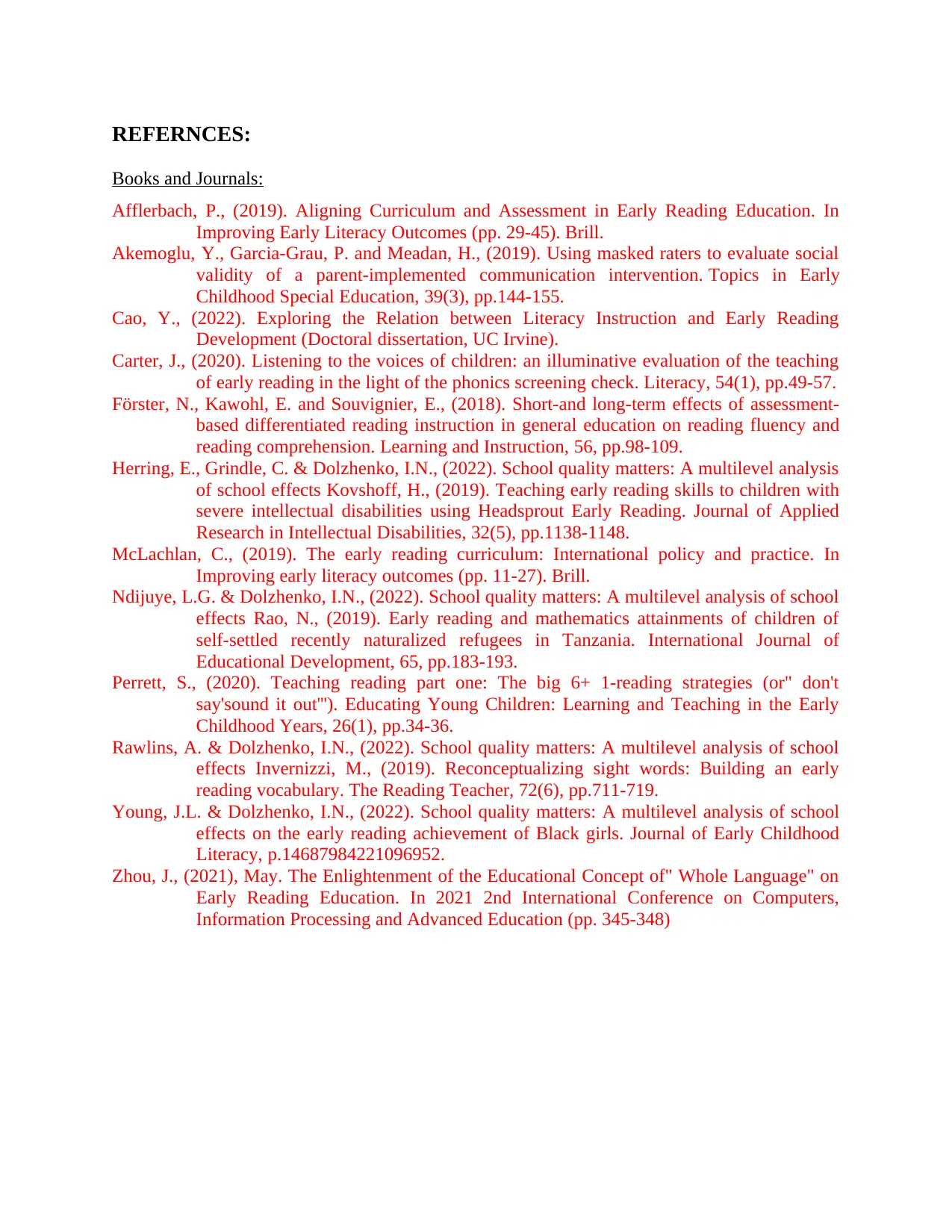
REFERNCES:
Books and Journals:
Afflerbach, P., (2019). Aligning Curriculum and Assessment in Early Reading Education. In
Improving Early Literacy Outcomes (pp. 29-45). Brill.
Akemoglu, Y., Garcia-Grau, P. and Meadan, H., (2019). Using masked raters to evaluate social
validity of a parent-implemented communication intervention. Topics in Early
Childhood Special Education, 39(3), pp.144-155.
Cao, Y., (2022). Exploring the Relation between Literacy Instruction and Early Reading
Development (Doctoral dissertation, UC Irvine).
Carter, J., (2020). Listening to the voices of children: an illuminative evaluation of the teaching
of early reading in the light of the phonics screening check. Literacy, 54(1), pp.49-57.
Förster, N., Kawohl, E. and Souvignier, E., (2018). Short-and long-term effects of assessment-
based differentiated reading instruction in general education on reading fluency and
reading comprehension. Learning and Instruction, 56, pp.98-109.
Herring, E., Grindle, C. & Dolzhenko, I.N., (2022). School quality matters: A multilevel analysis
of school effects Kovshoff, H., (2019). Teaching early reading skills to children with
severe intellectual disabilities using Headsprout Early Reading. Journal of Applied
Research in Intellectual Disabilities, 32(5), pp.1138-1148.
McLachlan, C., (2019). The early reading curriculum: International policy and practice. In
Improving early literacy outcomes (pp. 11-27). Brill.
Ndijuye, L.G. & Dolzhenko, I.N., (2022). School quality matters: A multilevel analysis of school
effects Rao, N., (2019). Early reading and mathematics attainments of children of
self-settled recently naturalized refugees in Tanzania. International Journal of
Educational Development, 65, pp.183-193.
Perrett, S., (2020). Teaching reading part one: The big 6+ 1-reading strategies (or" don't
say'sound it out'''). Educating Young Children: Learning and Teaching in the Early
Childhood Years, 26(1), pp.34-36.
Rawlins, A. & Dolzhenko, I.N., (2022). School quality matters: A multilevel analysis of school
effects Invernizzi, M., (2019). Reconceptualizing sight words: Building an early
reading vocabulary. The Reading Teacher, 72(6), pp.711-719.
Young, J.L. & Dolzhenko, I.N., (2022). School quality matters: A multilevel analysis of school
effects on the early reading achievement of Black girls. Journal of Early Childhood
Literacy, p.14687984221096952.
Zhou, J., (2021), May. The Enlightenment of the Educational Concept of" Whole Language" on
Early Reading Education. In 2021 2nd International Conference on Computers,
Information Processing and Advanced Education (pp. 345-348)
Books and Journals:
Afflerbach, P., (2019). Aligning Curriculum and Assessment in Early Reading Education. In
Improving Early Literacy Outcomes (pp. 29-45). Brill.
Akemoglu, Y., Garcia-Grau, P. and Meadan, H., (2019). Using masked raters to evaluate social
validity of a parent-implemented communication intervention. Topics in Early
Childhood Special Education, 39(3), pp.144-155.
Cao, Y., (2022). Exploring the Relation between Literacy Instruction and Early Reading
Development (Doctoral dissertation, UC Irvine).
Carter, J., (2020). Listening to the voices of children: an illuminative evaluation of the teaching
of early reading in the light of the phonics screening check. Literacy, 54(1), pp.49-57.
Förster, N., Kawohl, E. and Souvignier, E., (2018). Short-and long-term effects of assessment-
based differentiated reading instruction in general education on reading fluency and
reading comprehension. Learning and Instruction, 56, pp.98-109.
Herring, E., Grindle, C. & Dolzhenko, I.N., (2022). School quality matters: A multilevel analysis
of school effects Kovshoff, H., (2019). Teaching early reading skills to children with
severe intellectual disabilities using Headsprout Early Reading. Journal of Applied
Research in Intellectual Disabilities, 32(5), pp.1138-1148.
McLachlan, C., (2019). The early reading curriculum: International policy and practice. In
Improving early literacy outcomes (pp. 11-27). Brill.
Ndijuye, L.G. & Dolzhenko, I.N., (2022). School quality matters: A multilevel analysis of school
effects Rao, N., (2019). Early reading and mathematics attainments of children of
self-settled recently naturalized refugees in Tanzania. International Journal of
Educational Development, 65, pp.183-193.
Perrett, S., (2020). Teaching reading part one: The big 6+ 1-reading strategies (or" don't
say'sound it out'''). Educating Young Children: Learning and Teaching in the Early
Childhood Years, 26(1), pp.34-36.
Rawlins, A. & Dolzhenko, I.N., (2022). School quality matters: A multilevel analysis of school
effects Invernizzi, M., (2019). Reconceptualizing sight words: Building an early
reading vocabulary. The Reading Teacher, 72(6), pp.711-719.
Young, J.L. & Dolzhenko, I.N., (2022). School quality matters: A multilevel analysis of school
effects on the early reading achievement of Black girls. Journal of Early Childhood
Literacy, p.14687984221096952.
Zhou, J., (2021), May. The Enlightenment of the Educational Concept of" Whole Language" on
Early Reading Education. In 2021 2nd International Conference on Computers,
Information Processing and Advanced Education (pp. 345-348)
1 out of 10
Related Documents
Your All-in-One AI-Powered Toolkit for Academic Success.
+13062052269
info@desklib.com
Available 24*7 on WhatsApp / Email
![[object Object]](/_next/static/media/star-bottom.7253800d.svg)
Unlock your academic potential
Copyright © 2020–2026 A2Z Services. All Rights Reserved. Developed and managed by ZUCOL.




